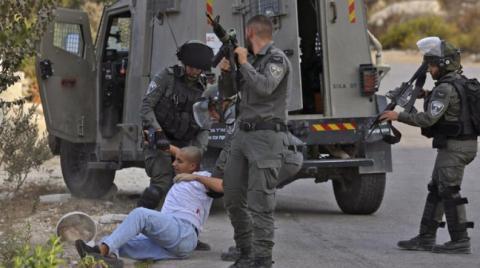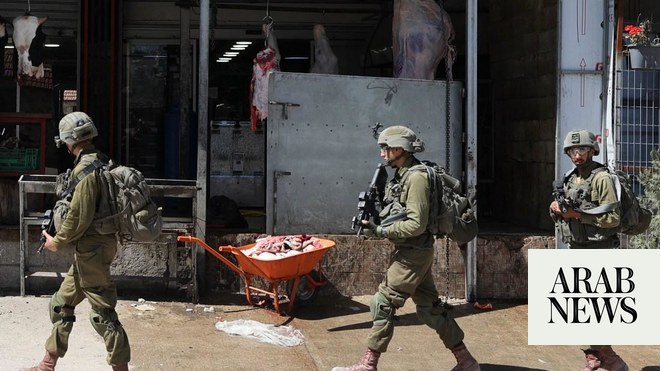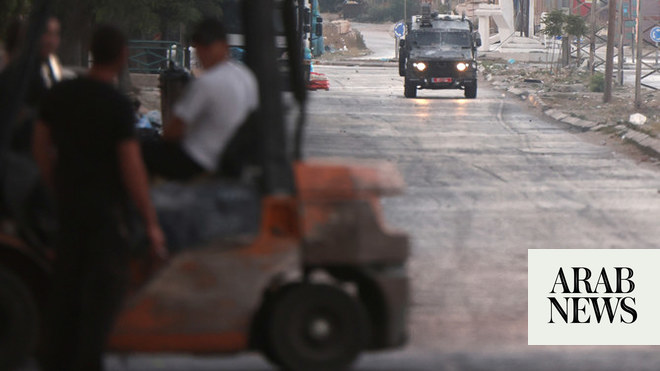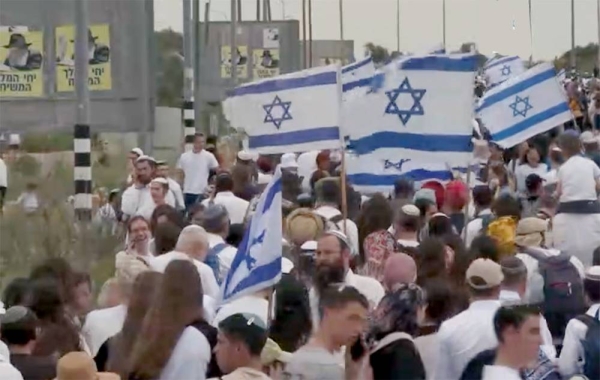
‘Apartheid’ fears grow after authorities ramp up settler road construction
RAMALLAH: A 22-year-old Palestinian man was killed by Israeli gunfire during a military raid in the occupied West Bank on Monday morning.
Omar Manna “Faraja” was killed in Bethlehem Dheisheh refugee camp after being hit by four bullets in the chest.
Another six people were injured, and four were arrested during the Israeli operation.
Troops stormed the refugee camp, sparking violent clashes with youths, official Palestinian sources said.
A comprehensive strike occurred in Bethlehem to mourn the murder of the Palestinian.
The killing took place as Israeli authorities started constructing settler-only roads in the West Bank.
Israel’s scheme aims to secure separate travel paths on shared roadways, reducing friction and violent clashes between Palestinians and settlers, Israeli armed forces and Palestinian sources told Arab News.
The Israeli plan includes the construction of streets near Nablus, Qalqilyia and between Bethlehem and Hebron, added the sources.
The process involves the seizure of thousands of acres of Palestinian land.
Israel had confiscated large swathes of Palestinian land for the construction of bypass roads since the signing of the Oslo agreement in late 1993, with the aim of dispersing Israeli settlers outside the Palestinian cities and towns across the West Bank.
Friction between Palestinian youths and Israeli defense forces over the protection of settler vehicles passing through shared roads across the West Bank has increased in recent months, leading to the deaths of several Palestinians by Israeli gunfire.
The significant increase in clashes includes stone-throwing as well as violent physical attacks by settlers on Palestinians.
Hiwara shared road is one of the most critical streets that the Israeli plan aims to replace with a bypass outside the town, Palestinian sources told Arab News.
Moein Al-Dumaidi, mayor of Hiwara, told Arab News that the street that Israeli authorities began paving in Hiwara is 6 km long.
Almost 1,100 dunums of village land was being seized for the work following a Israeli military decision.
“This is a method of confiscating the lands of Hiwara and appropriating it to serve the settlers,” Al-Dumaidi told Arab News.
However, the mayor hoped that the road would reduce tensions in the town.
Hiwara suffers from daily attacks by settlers and Israeli forces, leading to more than seven citizens being killed over the last three months, said the mayor.
The latest incident came on Dec. 3 when an Israeli soldier shot a child, Ammar Mufleh, leaving him to bleed to death over 20 minutes without providing treatment.
Al-Dumaidi said that killings had increased significantly since the election of Israel’s right-wing government.
Hiwara, with a population of 8,000, has 9,900 dunums, of which 7,500 are classified as Area C — under complete Israeli security and administrative control. Construction is prohibited within the Area C category, although 2,400 dunums classified as Area B can be used for building.
Mahmoud Barham, mayor of Beita, adjacent to Hawara, told Arab News that Israeli authorities had confiscated 400 dunums of Beita land containing olive trees to build a bypass road, which will be used exclusively by Israeli settlers.
“We demanded that the project to build this bypass road be stopped because it affects the entrance to our town,” Barham told Arab News.
Legal activist Amer Hamdan, who travels daily through the shared Hiwara street, told Arab News that separate lanes might reduce clashes between Palestinians, settlers and Israeli forces.
However, it could be classified as apartheid according to international law, Hamdan added.
Israel seeks to connect Israeli settlements from Hebron in the south of the West Bank to the Nablus area in the north through a network of streets for Israeli settlers.
“After settlers stop passing through streets shared with the Palestinians, no one will care about paving or maintaining existing roads,” Hamdan told Arab News.
“Even if a traffic accident occurs, the Palestinian police will not be able to reach the scene of the accident ... and the Israeli police will not be present, which will create a problem for the Palestinians who use these streets,” he added.
In 2019, Israel constructed a highway in eastern Jerusalem separated by a high concrete wall, dividing the road into two lanes — one for Palestinians and another for Israelis.
Meanwhile, Israeli authorities demolished homes in the village of Al-Araqib on Monday.
Local residents, predominantly Arab Bedouins, were threatened with displacement in the Negev region for the 210th time since the village’s first demolition in 2010.
Locals persist in rebuilding their tents — made from wood and a nylon cover — each time after demolition in order to be shielded from the intense summer heat and bitter cold of the winter.
Israeli authorities refuse to recognize the ownership of the land by the people of Al-Araqib, and have repeatedly demolished the village and razed crops.
Demolition orders continue in East Jerusalem after Israeli authorities destroyed a residential building in the Wad Qaddum neighbourhood in Silwan, south of Al-Aqsa Mosque.
The 17-year-old building included 10 apartments housing about 100 people.











